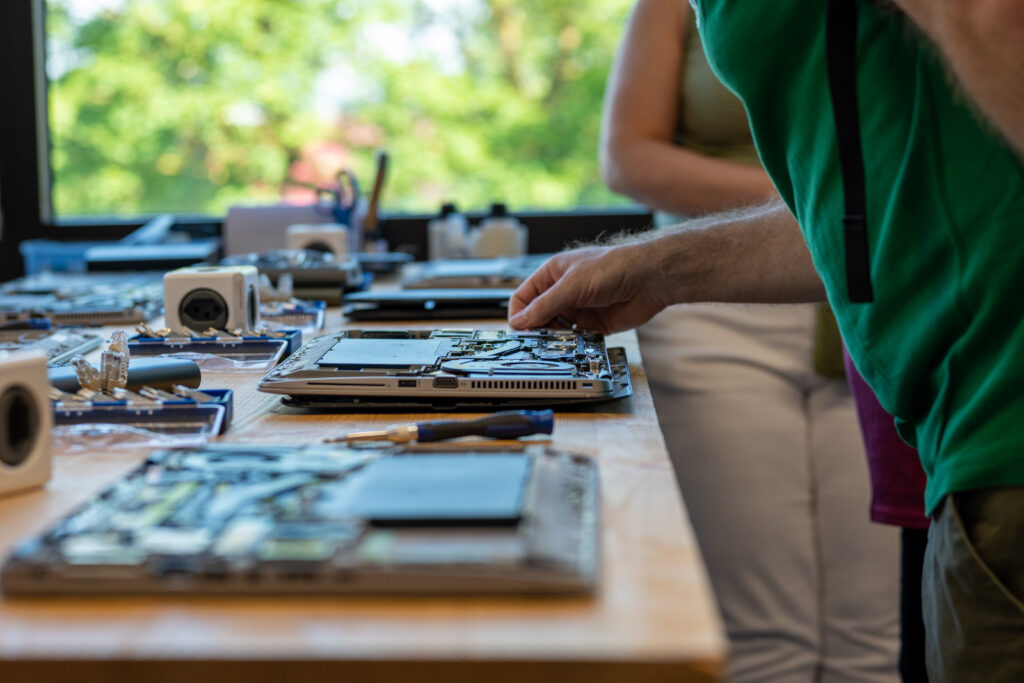
A lot of impact
For around four years, Wir lernen weiter (wLw) has been working hard to ensure that everyone in Switzerland has access to the digital world. This is not possible without flexibility.
The mission
Anyone without basic IT equipment today is excluded from many things. For example, in job application processes, but also in education and everyday life. People who cannot afford such equipment are caught up in a maelstrom of exclusion from which it is already extremely difficult to escape. The consequences of this digital divide are more limited opportunities to participate in social and economic life in the short term. In the medium to long term, however, these people also lack the skills to use digital tools properly.
If we don't give people living in poverty the tools to participate in digital life, we are destroying opportunities for reintegration. A laptop does not guarantee an escape from poverty, but it does open up the opportunity to do so: at least that is our thesis.
Tobias Schär, founder and managing director of wLw
At the same time, countless laptops are disposed of throughout Switzerland every year, even though they could fulfil a good purpose for much longer. The reasons for this are, on the one hand, that many companies and organisations set limited usage times for mobile devices such as laptops. On the other hand, there is also a lack of awareness in many places that poverty exists in Switzerland. According to the association team, those who are poor are strongly stigmatised. According to Tobias Schär (founder and managing director of wLw), being poor in Switzerland is "anything but fun".
Hence the idea: why not collect disused laptops to equip people living in poverty? Well: thought, done. In April 2020, Schär started out alone with an idea to turn thoughts into action. In the meantime, a team of several people is working every day to send as many laptops as possible to where they are urgently needed.

How to implement this
But who is poor and who is not? This question is not answered by the organisation itself, but by its partners. For example, municipal/regional social services, cantonal migration offices and aid organisations. Each of these organisations must adhere to clear rules when assessing applications and must evaluate them according to clear criteria. "This is the only way, because we don't have any data," says Schär. For data protection reasons, it would also be unacceptable for the association to request technical tax documents, for example. Schär also believes that the association's work takes a huge financial and technical burden off the organisations.
The organisation charges a one-off and always the same contribution towards expenses for each laptop handed in. For example, a social welfare office that simply purchases devices pays a one-off CHF 250 for a device. This includes the set-up and ready-to-use device, as well as access to the free support hotline via WhatsApp, which further relieves the burden on partners during aftercare. Organisations that also provide the association with discarded devices (so-called cycle partners) only pay CHF 150 per laptop.
How's it going?
According to Schär, there are currently various factors that are slowing down the association's work:
- Federal social welfare system in Switzerland
- Lack of financial support from national/cantonal authorities
- Lack of awareness (poverty, but also equipment donations)
Fortunately, the operational team is not left to deal with these problems on its own, but can count on a good network of supporters. In April 2024, the association had around 50 members from various specialist areas. The association also regularly attends specialist events, although Schär clearly notes that there is often simply not enough time for this.
However, the team is delighted that after just four years, over 11,000 laptops have been given to people living in poverty. Almost half of all municipalities are already partners of the association. "But it will be a long time before society understands why we do what we do and what we need to do it. The technical complexity is also often underestimated," explains Schär.
We don't run a clothes collection or food distribution centre, but have to securely clean, check, repair and refurbish technical devices and then pass them on in a targeted manner. The process landscape is not really homogeneous, but very complex.
Tobias Schär, founder and managing director of wLw
How can you help?
According to Schär, the easiest way is to talk about the club: Be it in your own business, in your private environment or at any other opportunity. However, he hopes that the association can continue to work towards its ultimate goal for a long time to come: namely that digitalisation should not become an income-dependent privilege, but a basic right for everyone in Switzerland.
Stay up to date!
